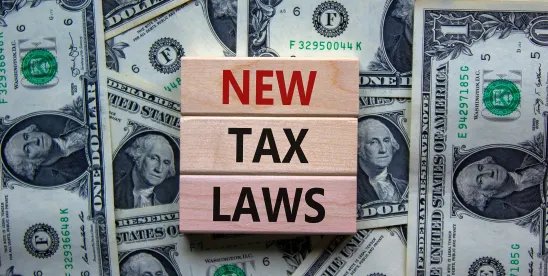On Monday, 16 June 2025, the Senate Finance Committee released its version (the Senate Proposal) of the Section 899 retaliatory tax provisions that also are included in the “One Big Beautiful Bill Act” (the Act) that was passed by the House of Representatives on 22 May 2025.1 The Senate Proposal contains significant changes (in both form and substance) from the House-passed provision (House Proposal). For a discussion of the House Proposal and the impact it would have on certain cross-border transactions, see our previous alert.
Significant Changes in US Senate Proposal
Below is a summary of certain significant changes to Code Section 8992 in the Senate Proposal.
Delayed Start Date
Under the House Proposal, Code Section 899 would apply to calendar year taxpayers starting in 2026. Under the Senate Proposal, Code Section 899 would apply to calendar year taxpayers starting in 2027.
Lower Increased Rates of Tax
Under the House Proposal, the US tax rates to which an “applicable person” is subject would increase by five percentage points per year, up to a maximum of 20 percentage points above the applicable statutory rate (determined without regard to a reduced rate). Under the Senate Proposal, the US tax rates to which an “applicable person” is subject would increase by five percentage points per year, up to a maximum of 15 percentage points above the rate to which the applicable person would otherwise be subject (which may be a reduced rate). For example, an applicable person that is eligible for a 0% tax rate under a US tax treaty would (assuming Section 899 overrides the 0% treaty rate) be subject to a maximum US withholding tax rate of 50% under the House Proposal, which is reduced to a maximum US withholding tax rate of 15% under the Senate Proposal.
Fewer Exclusions Survive Code Section 899
Under the House Proposal, certain statutory tax exemptions and exclusions, such as the portfolio interest exemption, would not be impacted by Code Section 899. Under the Senate Proposal, while certain enumerated exemptions and exclusions, notably including the portfolio interest exemption, are not impacted by Code Section 899, any exemptions or exclusions not enumerated may be impacted. This calls into question the viability of numerous existing tax exclusions and exemptions for which applicable persons may be eligible, such as (1) exclusions under income tax treaties (such as a prohibition on the taxation of interest income by the United States and exclusions appliable to certain categories of foreign treaty residents) and (2) the exclusion for FIRPTA gains afforded to qualified foreign pension plans (QFPFs).
Certain Unfair Foreign Taxes No Longer Trigger Increased US Tax Rates
Under the House Proposal, applicable persons with respect to any country that enacted an “unfair foreign tax” (referred to as a discriminatory foreign country) would be subject to increased US tax rates. An unfair foreign tax included an undertaxed profits rule (UTPR) tax, a diverted profits tax (DPT), a digital services tax (DST), and certain other taxes identified by the Secretary of the Treasury. Under the Senate Proposal, countries whose applicable persons are subject to increased US tax rates would include only those countries that have enacted an “extraterritorial tax” (which generally includes a UTPR tax but does not include a DPT or a DST). However, the Super BEAT provisions discussed below would apply to any “offending foreign country,” that is, any country that has enacted any unfair foreign tax, including a UTPR tax or a DST (a DPT is not a per se unfair foreign tax under the Senate Proposal). See our previous alert for a list of countries imposing one or more of these taxes.
Changes to Super BEAT
Under the House Proposal, the 3% BEAT base erosion payments threshold would have been eliminated entirely for US corporations majority-owned by applicable persons. Under the Senate Proposal, the BEAT base erosion payments threshold is retained, but (1) is reduced to 0.5% for US corporations that are majority-owned by applicable persons, and (2) is reduced to 2% for all other US corporations. In addition, whereas the House Proposal would have established a higher Super BEAT tax rate under Code Section 899, the Senate Proposal increases the BEAT tax rate under Code Section 59A to 14% for all taxpayers (regardless of ownership by applicable persons). The Senate Proposal also adds a “high-tax” exception to base erosion payments under the regular BEAT that is not applicable to taxpayers subject to the Super-BEAT.3
In summary
The Senate Proposal is less disruptive than the House Proposal in certain respects, including the deferral of its effective date of Code Section 899 by one year and the lower cap on US tax rate increases (15 percentage points above the US tax rates that would otherwise be applicable, compared with 20 percentage points above US statutory tax rates without regard to any reduction in rate in the House Proposal). Notwithstanding the foregoing, the Senate Proposal (like the House Proposal) would have a significant impact on investment and operations in the United States by applicable persons. It would also override significant exemptions and exclusions under the Code that were thought to have been unaffected by the House Proposal, such as the exemption for QFPFs from FIRPTA gains.
Next Steps
There are several procedural and political hurdles for Congress to clear before Section 899 becomes law.
As has become the norm for recent landmark tax legislation when one Party controls the White House and both chambers of Congress, the Act is being considered under the reconciliation process. Reconciliation provides a statutory relief from the normal filibuster and cloture process for Senate debate, effectively overriding a requirement of a sixty-vote majority to pass legislation through the Senate.4 Instead, a simple majority vote in the Senate is sufficient to pass budget reconciliation legislation. In exchange for this “privileged” status, such legislation is limited to provisions with a budgetary impact and is subject to restrictions called the Byrd Rule.
The Senate Proposal currently is undergoing the “Byrd Bath,” where the minority Party challenges certain provisions as “extraneous” and in violation the Byrd Rule, with the Senate Parliamentarian ruling on these challenges. The Section 899 proposal is expected to be challenged under this procedure.
There are several ways that a provision may be considered extraneous, including (i) if it addresses an item outside the jurisdiction of the committee that is responsible for the provision or (ii) if it produces changes in revenue or spending which are merely incidental to the non-budgetary components of the provision (i.e., its budgetary impact does not substantially outweigh its policy implications).5
Section 899 has already survived one Byrd Rule challenge, with the Parliamentarian ruling that it rightly falls under the jurisdiction of the Senate Finance Committee and not the Foreign Relations Committee, the body generally tasked with issues impacting US treaty obligations. An additional challenge is expected on the grounds that Section 899 is primarily a policy proposal intended to backstop President Trump’s tariff policy rather than a budgetary measure. A ruling is expected later this week.
For the Act to become law, the House and the Senate must agree on the same bill. If the proposal survives the Byrd Rule challenge and passes the Senate in its current form as part of the complete Act, the House must either pass an identical version of the Act or revise the bill and return it to the Senate to reconsideration. Section 899 may be revised as part of this process, but it is expected to be included in final legislation. Both chambers hope to pass the Act in time for a 4 July 2025 signing ceremony by President Trump. Although discussions are ongoing among the White House, House, and Senate, given the significant differences between the House and Senate versions as they currently exist, reaching consensus that quickly may not be viable. A more realistic timeline may be to approve the legislation before the August recess.
Footnotes
1 Chairman Crapo Releases Finance Committee Reconciliation Text, June 16, 2025, available at https://www.finance.senate.gov/chairmans-news/chairman-crapo-releases-finance-committee-reconciliation-text.
2 Section 899 is not currently a section of the Internal Revenue Code of 1986, as amended (the Code). References to Code Section 899 herein are to such section as set forth in the House Proposal and Senate Proposal.
3 The US Senate Proposal contains other noteworthy revisions to US international tax provisions that are outside the scope of this alert.
4 See Standing Rules Of The Senate, R. XXII, S. Doc. No. 113–18 (2013).
5 2 U.S.C. § 644(b)(1), Extraneous matter in reconciliation legislation. Other limitations include (i) where the provision does not produce a change in government spending or revenues; (ii) if the net effect of provisions reported by the committee overseeing the provision fails to achieve its reconciliation instructions; (iii) the provision increases the deficit beyond the 10-year reconciliation window; or (iv) if the provision makes changes to Social Security.






 />i
/>i

